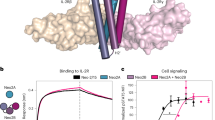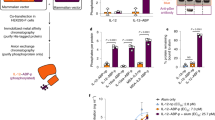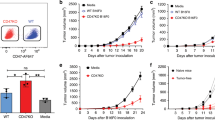Abstract
Cytokine gene transfer into tumor cells has been shown to mediate tumor regression and antimetastatic effects in several animal models via immunomodulation. Therefore, clinical protocols have been developed to treat cancer patients with cytokine gene-modified tumor cells. We inserted the genes coding for the p35 and p40 chain of interleukin-12 (IL-12) in two independent eukaryotic expression vectors and transduced melanoma cells of 15 different primary tumor cultures with both plasmids by a ballistic gene transfer approach. Secreted IL-12 demonstrated strong bioactivity by inducing interferon-γ release from peripheral blood lymphocytes upon coculture with cell culture supernatants after IL-12 gene transfer which could at least partly be blocked by IL-12-specific antisera. Further enrichment of transduced tumor cells by magnetic separation directly after gene transfer increased cytokine secretion from a mean of 119 pg in the unsorted to 507 pg IL-12 (24 h/106 cells) in the magnetically enriched cell fraction. Irradiation of these cells led to a further elevation of secreted IL-12 (mean 987 pg). Elevated IL-12 levels were detected over 7 days after irradiation in vitro. In a subsequent first clinical phase I study six patients with metastatic melanoma were vaccinated with autologous, interleukin-12 gene-modified tumor cells. Melanoma cells were expanded in vitro from surgically removed metastases, transduced by ballistic gene transfer, irradiated and were then injected subcutaneously (s.c.) at weekly intervals. Clinically, there was no major toxicity except for mild fever. All patients completed more than four s.c. vaccinations over 6 weeks and were eligible for immunological evaluation. Post-vaccination, peripheral mononuclear cells were found to contain an increased number of tumor-reactive proliferative as well as cytolytic cells as determined by a limiting dilution analysis in two patients. Two patients developed DTH reactivity against autologous melanoma cells and one had a minor clinical response. Biopsies taken from that patient’s metastases revealed a heavy infiltration of CD4+ and CD8+ T lymphocytes. In conclusion, vaccination induced immunological changes even in a group of advanced, terminally ill patients. These changes can be interpreted as an increased antitumor immune response.
This is a preview of subscription content, access via your institution
Access options
Subscribe to this journal
Receive 12 print issues and online access
$259.00 per year
only $21.58 per issue
Buy this article
- Purchase on Springer Link
- Instant access to full article PDF
Prices may be subject to local taxes which are calculated during checkout
Similar content being viewed by others
Author information
Authors and Affiliations
Rights and permissions
About this article
Cite this article
Sun, Y., Jurgovsky, K., Möller, P. et al. Vaccination with IL-12 gene-modified autologous melanoma cells: preclinical results and a first clinical phase I study. Gene Ther 5, 481–490 (1998). https://doi.org/10.1038/sj.gt.3300619
Received:
Accepted:
Published:
Issue Date:
DOI: https://doi.org/10.1038/sj.gt.3300619
Keywords
This article is cited by
-
IL-12 immunotherapy of Braf-induced papillary thyroid cancer in a mouse model
Laboratory Investigation (2016)
-
Design and characterization of the tumor vaccine MGN1601, allogeneic fourfold gene-modified vaccine cells combined with a TLR-9 agonist
Molecular Therapy - Oncolytics (2016)
-
Interleukin 12: still a promising candidate for tumor immunotherapy?
Cancer Immunology, Immunotherapy (2014)
-
Evaluation of biolistic gene transfer methods in vivo using non-invasive bioluminescent imaging techniques
BMC Biotechnology (2011)
-
Inhibition of a vascular ocular tumor growth by IL-12 gene transfer
Clinical & Experimental Metastasis (2007)



